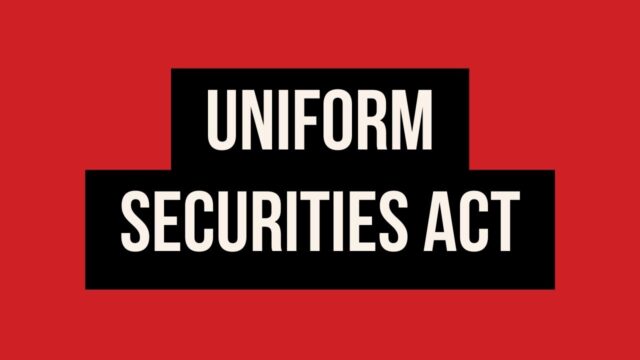
What is the Uniform Securities Act and what does it do
The Uniform Securities Act is a set of laws that governs the offer and sale of securities. These laws are designed to protect investors from fraud and misrepresentation, and to ensure that securities are traded in a fair and orderly fashion. The Uniform Securities Act is administered by the Securities and Exchange Commission (SEC), and all broker-dealers and investment advisers must register with the SEC in order to do business. The SEC also oversees the activities of the stock exchanges, and enforces the rules of fair trading. The Uniform Securities Act is an important part of the regulatory framework that ensures the integrity of the securities markets.
How does the Uniform Securities Act protect investors
The goal of the Act is to protect investors from fraud and misrepresentation. For example, the Act requires that all securities must be registered with the state before they can be sold. This ensures that potential investors have access to information about the security, such as its financial history and risks. In addition, the Act prohibits insider trading, which is when people who have access to non-public information about a company use that information to make profits by buying or selling shares. By preventing insider trading and requiring disclosure of information, the Uniform Securities Act helps to level the playing field for all investors.
What are some of the key provisions of the Uniform Securities Act
Some of the key provisions of the Act include the requirement that all offers and sales of securities be registered with the Securities and Exchange Commission, and that all individuals who sell securities be licensed by the Commission. The Act also prohibits certain types of fraud, such as insider trading, and requires disclosure of material information about the security being offered. By ensuring that investors have access to accurate information and are protected from fraud, the Uniform Securities Act helps to promote fair and efficient markets.
What are the benefits of compliance with the Uniform Securities Act
Compliance with the Act provides several benefits for both investors and businesses. For investors, compliance with the Act helps to ensure that they receive accurate and complete information about investments, and that their money is protected from fraud. For businesses, compliance with the Act provides certainty and stability in the securities market, making it easier to raise capital. In addition, businesses that are registered with the SEC can avoid state-by-state registration requirements, which can be costly and time-consuming. Ultimately, compliance with the Uniform Securities Act benefits both investors and businesses by providing greater transparency and protection in the securities market.
How can businesses comply with the Uniform Securities Act
Businesses that wish to comply with the Uniform Securities Act must first register with the state securities commission. They must then file a disclosure document that contains information about the business, its officers and directors, and the securities being offered for sale. Businesses must also provide potential investors with information about the risks involved in investing in their securities. Finally, businesses must adhere to certain restrictions on how they can advertise and sell their securities. By following these guidelines, businesses can help ensure that they are complying with the Uniform Securities Act.
What are the penalties for violating the Uniform Securities Act
Violations of the act can result in civil or criminal penalties. Civil penalties may include fines, restitution, or Disgorgement, which is the return of ill-gotten gains. Criminal penalties can range from a misdemeanor charge with a maximum sentence of one year in jail to a felony charge with a maximum sentence of five years in prison.
In addition, individuals who violate the Uniform Securities Act may be subject to regulatory actions by state securities commissions or the Securities and Exchange Commission. These actions can include cease-and-desist orders, revocation of licenses, or civil monetary penalties. Violations of the Uniform Securities Act can have serious consequences, so it is important to comply with the law if you are involved in the sale of securities.
What are some recent cases involving the Uniform Securities Act
In recent years, the Act has been used in a number of high-profile cases. For instance, in 2015, the U.S. Securities and Exchange Commission filed a lawsuit against Apple CEO Steve Jobs for allegedly violating the Act by backdating stock options. Jobs eventually settled the case for $24 million. More recently, in 2018, Tesla founder Elon Musk was accused of violating the Act when he made misleading statements about taking the company private. The SEC ultimately fined Musk $20 million and required him to step down as Chairman of Tesla’s board. As these cases illustrate, the Uniform Securities Act continues to play an important role in regulating the securities market.
Tips for complying with the Uniform Securities Act
There are a few key things to keep in mind when complying with the Act. First, all offers and sales of securities must be registered with the appropriate regulatory agency. Second, businesses must disclose material information about the security being offered, including the risks involved. Finally, businesses cannot make false or misleading statements about the security or the issuer. By following these guidelines, businesses can ensure that they are in compliance with the Uniform Securities Act.


































